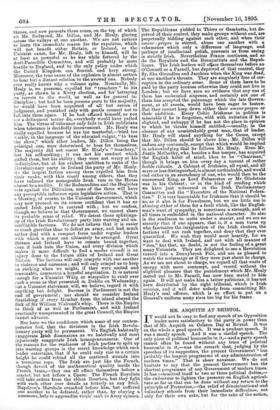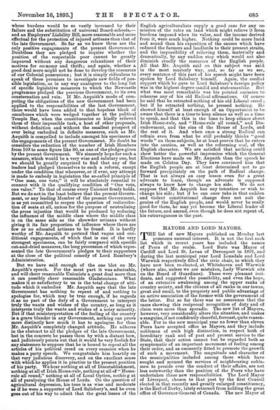MR. ASQ1TITH AT BRISTOL.
IT would not be esay to find any speech of an Opposition leader more satisfactory to the party in power than that of Mr. Asquith on Colston Day at Bristol. It was on the whole a good speech. It was a prudent speech. It was a manly speech. And it was a candid speech. The only piece of political buncombe in it,—and a party speech cannot often be found without any trace of political buncombe in it,—was the remark that, judging by the speeches of its supporters, the present Government "has probably the longest programme of any administration of modern times." That is sheer nonsense. We do not hesitate to say that the present Government has the shortest programme of any Government of modern times. It has committed itself to two or three political duties,— the endeavour to lighten the pressure on English agricul- ture so far as that can be done without any return to the principle of Protection,—the relief of denominational and voluntary schools from their immediate difficulties, not only for their own sake, but for the sake of the nation, whose burdens would be so vastly increased by their failure and the substitution of universal Board-schools,- and an Employers' Liability Bill, more reasonable and more effectual for the protection of injured artisans than that of the late Government. So far as we know these are the only positive engagements of the present Government. Doubtless they are pledged to inquire whether the position of the respectable poor cannot be greatly improved without any dangerous relaxations of their motives for economy and thrift; and again, whether a good deal more might not be done to develop the resources of our Colonial possessions ; but it is simply ridiculous to speak of these promises to investigate new fields of pos- sible legislation, as in any way analogous to the long list of specific legislative measures to which the Newcastle programme pledged the previous Government, to its own consternation and ruin. If Mr. Asquith's mode of com- puting the obligations of the new Government had been applied to the responsibilities of the last Government, there would have been added to that hopeless block of omnibuses which were wedged together at the political Temple Bar, when the constituencies so kindly relieved them of their impossible task, a host of other proposals, without definition and without the smallest prospect of ever being embodied in definite measures, such as Mr. Asquith is compelled to include amongst his specimens of the engagements of the present Government. No doubt he considers the reduction of the number of Irish Members from 103 to some figure like 80, as one of the pledges given by the present Government. We sincerely hope for such a measure, which would be a very wise and salutary one, but we should be greatly surprised to find that any of the leaders had pledged themselves to such a reform, except under the condition that whenever, or if ever, any attempt is made to embody in legislation the so-called principle of "One man, one vote," it will be absolutely essential to connect with it the qualifying condition of "One vote, one value." To that of course every Unionist firmly holds. But we do not in the least believe that the present Govern- ment, or any leading Member of the present Gevernment, is as yet committed to reopen the question of redistribu- tion of seats at all, unless for the purpose of neutralising the gross injustice that would be produced by reducing the influence of the middle class where the middle class is on the same side as the shrewder artisans without giving it its fair proportion of influence where there are few or no educated artisans to be found. It is hardly worthy of Mr. Asquith to pretend that vague and con- ditional engagements, of which that is one of the very strongest specimens, can be fairly compared with specific cut-and-dried measures, the long procession of which repre- sented the late Government's pledges to their supporters at the close of the political comedy of Lord Rosebery's Administration.
But we have said enough of the one blot on Mr. Asquith's speech. For the most part it was admirable, and will cheer reasonable Unionists a great deal more than it can possibly cheer reasonable Gladstonians. What makes it so satisfactory to us is the total change of atti- tude which it embodies. Mr. Asquith says that the late Government has nothing to repent of and nothing to apologise for, which may be true enough, if he regards it as no part of the duty of a Government to interpret truly the wants and wishes of the country, so long as it interprets truly the wants and wishes of a noisy minority. But if that misinterpretation of the feeling of the country is a grave blunder in any Government, nothing can prove more distinctly how much it has to apologise for than -Mr. Asquith's completely changed attitude. He adheres in the abstract to all the pledges of the late Government, but in the concrete he passes them by with a distant bow, and judiciously points out that it would be very foolish for any statesmen to suppose that he is bound to repeat all the articles of his political creed on every occasion when he makes a party speech. We congratulate him heartily on that ver7 judicious discovery, and on the excellent sense with which he applies it in practice to the present position of his party. We hear nothing at all of Disestablishment, nothing at all of Irish Home-rule, nothing at all of" Home- rule all round," nothing at all of Local Option, nothing at all of paralysing the House of Lords. On the question of agricultural depression, his tone is as wise and moderate as if he were a supporter of Lord Salisbury's, and he even goes out of his way to admit that the great losses of the English agriculturalists supply a good case for any re- mission of the rates on land which might relieve it from burdens imposed when its value, and the income derived from it, were much higher. Nothing could be more lucid and sound than his exposition of the causes which have reduced the farmers and landlords to their present straits, and the impossibility of relieving them, materially and dramatically, by any sudden step which would not also. diminish cruelly the resources of the English people. All that Mr. Asquith said on this subject was sal& in the most masterly way, and, so far as we see,. every sentence of this part of his speech might have been spoken by Lord Salisbury himself. Again, the cordial support which be gave to Lord Salisbury's foreign policy was in the highest degree candid and statesmanlike. But what was most remarkable was his pointed omission to. rehearse any of his old Radical affirmations. Of course he said that he retracted nothing of his old Liberal creed but if he retracted nothing, he pressed nothing. He showed himself at least enough of an Opportunist to be aware that there is a time to keep silence as well as a time to speak, and that this is the time to keep silence about Irish Home-rule, and "Home-rule all round," and Din- endowment, and the sins of the House of Lords, and the rest of it. And when once a strong Radical can refrain even from what he still probably thinks "good words" on these subjects, he at least proves that he enters into the caution, as well as the reforming zeal, of the English character. We are satisfied that nothing could show better the powerful impression which the General. Elections have made on Mr. Asquith than the speech he- made on Colston Day. They have convinced him that- the English people are at least determined not to go forward precipitately on the path of Radical change. That is not always an easy lesson even for a great advocate to learn, though an advocate is supposed always to know how to change his side. We do not suppose that Mr. Asquith has any intention or wish to- change his side; but if he can once take in that sudden. and violent constitutional change does not suit the- genius of the English people, and would never be really good for them, he may yet become the Liberal leader of the future, and amend, even though he does nbt repent of, his extravagances in the past.



















































 Previous page
Previous page